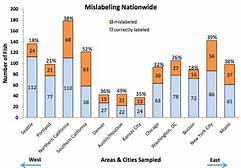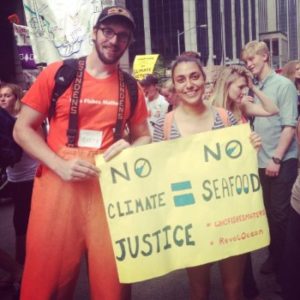Hi Everyone,
If you missed my interview from last Thursday, you’ll want to listen to it below, to find out how you can help support our local fisherman, while demanding transparency in our fish supply. Brett Tolley comes from a  four generation fishing family off the coast of Cape Cod, so he saw first hand how the corporate takeover and privatization of our oceans was not only ruining our access to fresh fish, but it was ruining the ecosystem needed to keep it alive. Aquaculture, also known as farm raised fish, is the fasted growing segment of the fish market, yet it has huge negative consequences when it is done on an industrial level. There are small, local, aquaculture farms raising fish in a more
four generation fishing family off the coast of Cape Cod, so he saw first hand how the corporate takeover and privatization of our oceans was not only ruining our access to fresh fish, but it was ruining the ecosystem needed to keep it alive. Aquaculture, also known as farm raised fish, is the fasted growing segment of the fish market, yet it has huge negative consequences when it is done on an industrial level. There are small, local, aquaculture farms raising fish in a more  sustainable way, but the corporate, industrial model is poisoning our fish and wrecking havoc on our oceans. They feed the fish pellets made with GMO’s, chicken scraps, antibiotics and artificial color, nothing you want to be eating. He suggested we check out Bren Smith, who is doing “good aquaculture” right here on Long Island. I was also shocked at some of the statistics Brett shared with me, like 99% of the shrimp consumed in the US is imported and is farmed using slave labor, and that 30% of fish sold in fish markets is considered fraudulent or mis-labeled. He also shared with me some information about QR (Quick Response) Codes : which are scan-able codes that can tell you the origin of your fish, who caught it, what boat and when. He suggests we all ask about the QR code when purchasing fish, and if the seafood seller can’t tell you, that’s probably a red flag. QR codes are expanding through companies like Reds Best and also Long Island-based Dock to Dish, which is pioneering the push for seafood trace-ability. Check them out!! A few other sites Brett suggested we look into is NOAA, the National Oceanic and Atmospheric Administration’s website on wild catch fisheries, Revol-Ocean, which is NAMA’s organization for getting involved in the movement, and LocalCatch.org, for finding a Community Supported Fishery near you. If you missed our interview, you can listen to it here!
sustainable way, but the corporate, industrial model is poisoning our fish and wrecking havoc on our oceans. They feed the fish pellets made with GMO’s, chicken scraps, antibiotics and artificial color, nothing you want to be eating. He suggested we check out Bren Smith, who is doing “good aquaculture” right here on Long Island. I was also shocked at some of the statistics Brett shared with me, like 99% of the shrimp consumed in the US is imported and is farmed using slave labor, and that 30% of fish sold in fish markets is considered fraudulent or mis-labeled. He also shared with me some information about QR (Quick Response) Codes : which are scan-able codes that can tell you the origin of your fish, who caught it, what boat and when. He suggests we all ask about the QR code when purchasing fish, and if the seafood seller can’t tell you, that’s probably a red flag. QR codes are expanding through companies like Reds Best and also Long Island-based Dock to Dish, which is pioneering the push for seafood trace-ability. Check them out!! A few other sites Brett suggested we look into is NOAA, the National Oceanic and Atmospheric Administration’s website on wild catch fisheries, Revol-Ocean, which is NAMA’s organization for getting involved in the movement, and LocalCatch.org, for finding a Community Supported Fishery near you. If you missed our interview, you can listen to it here!

Comments are closed.